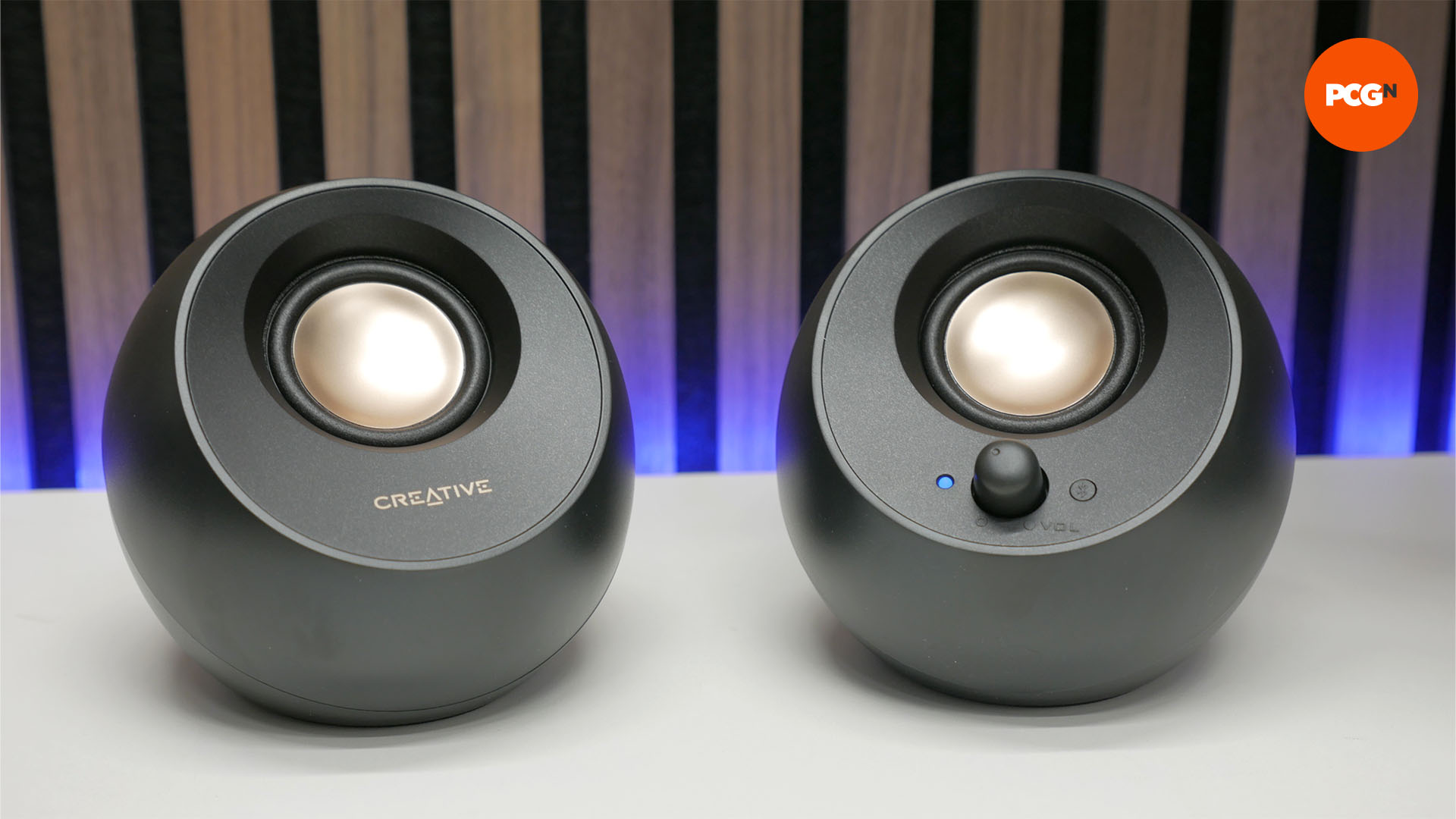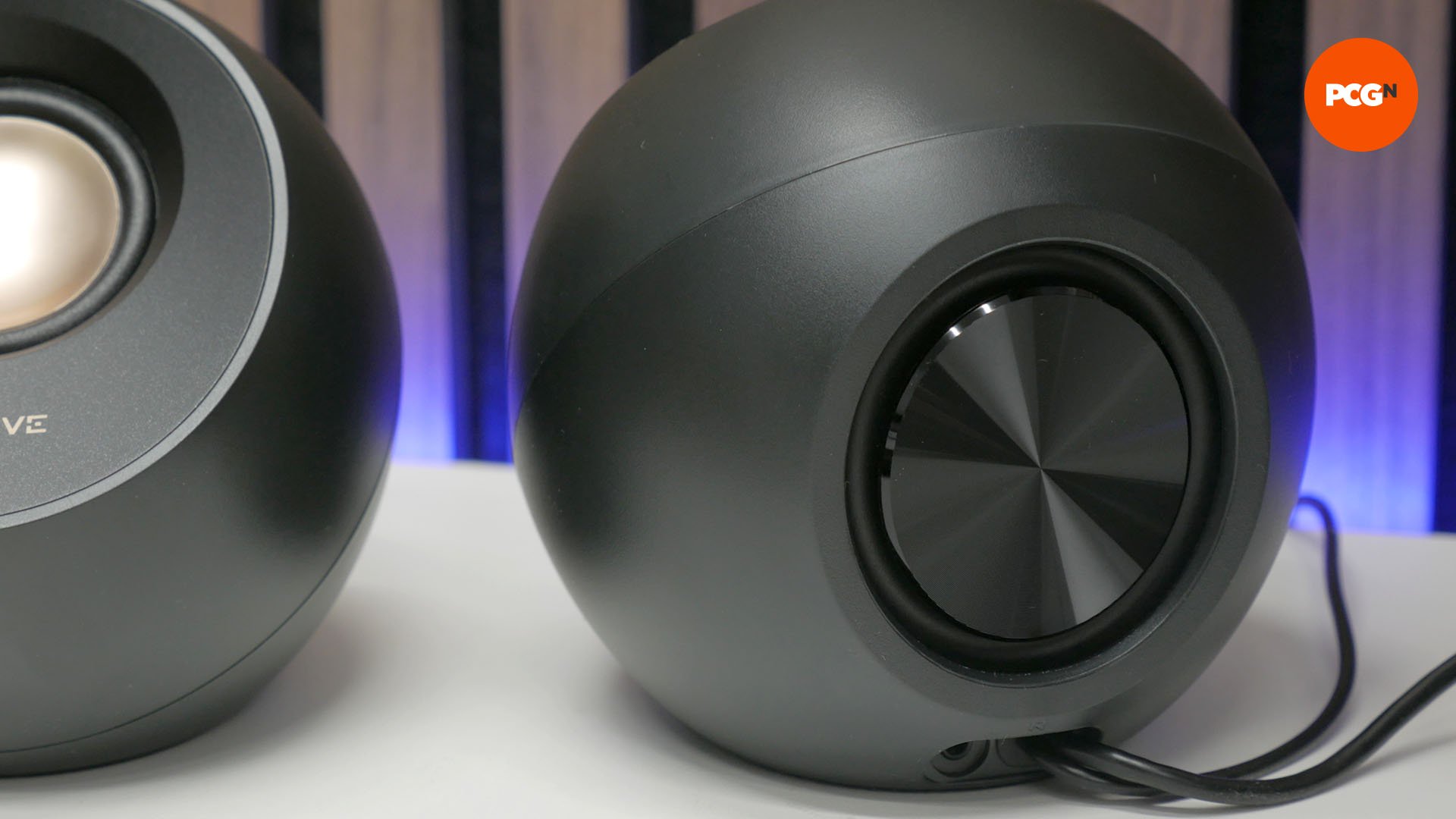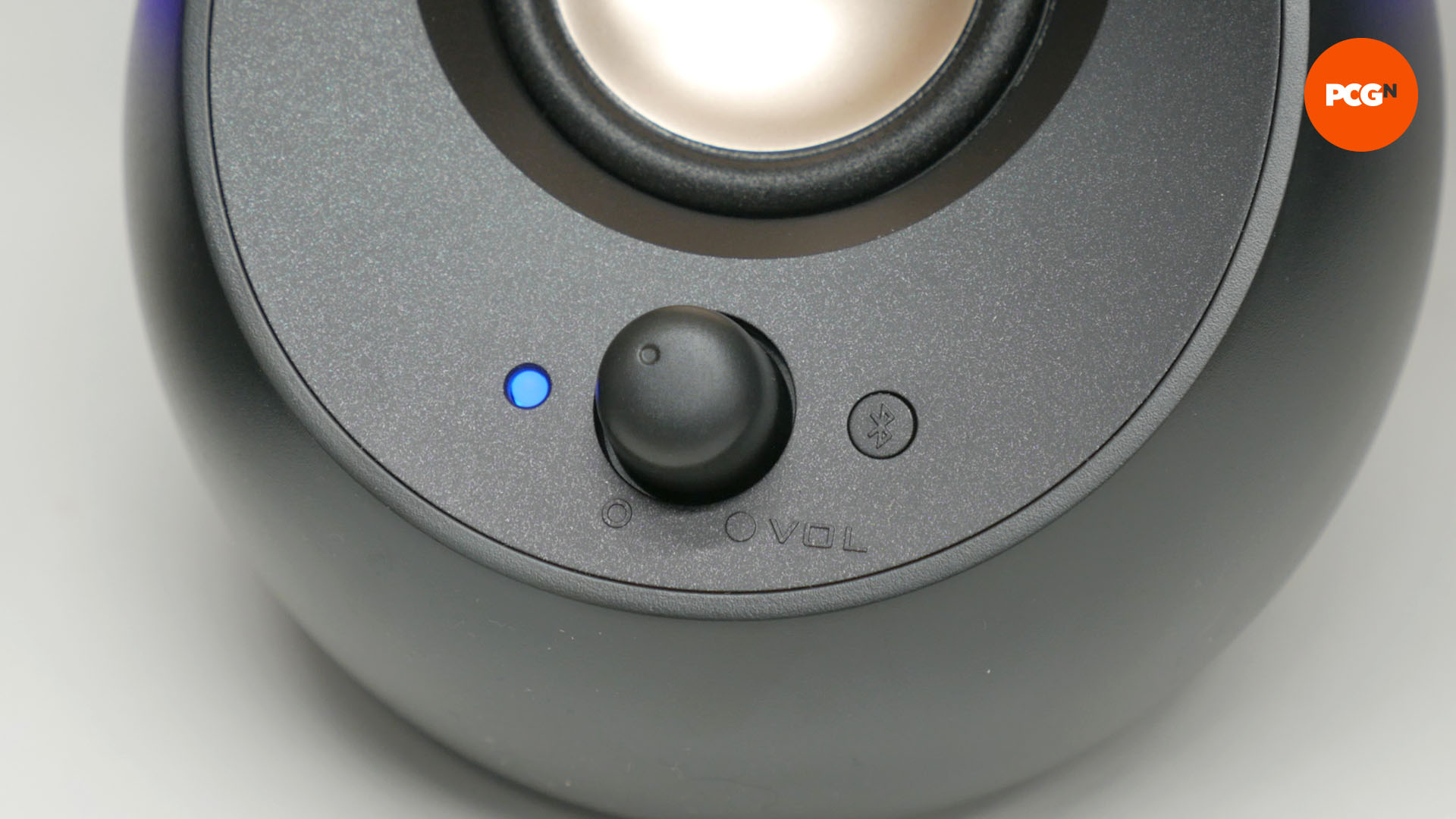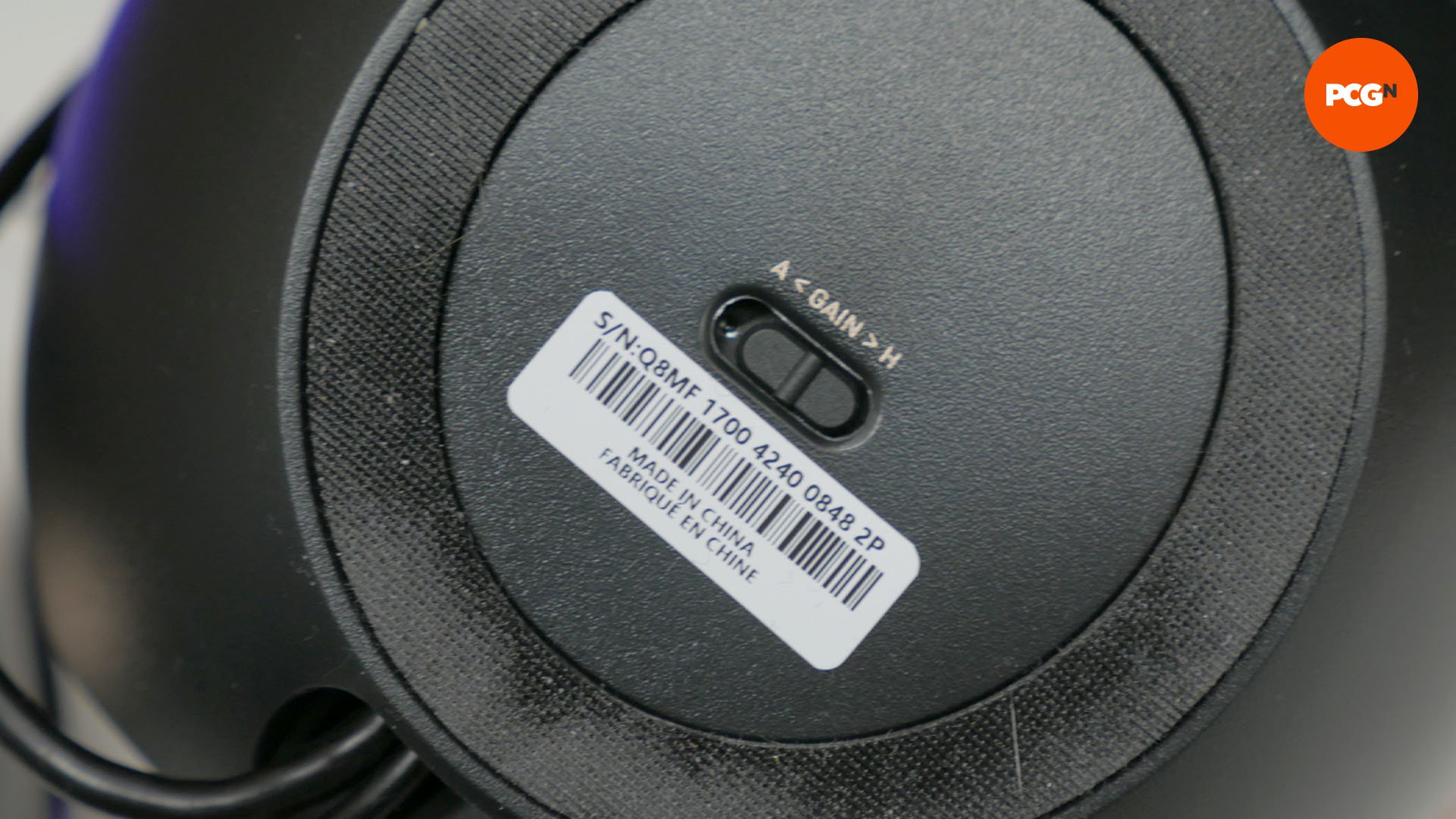Our Verdict
The Pebble V3 design is a bit odd, but the simple USB connection and addition of Bluetooth makes this a super convenient set of speakers to set up. They’re also very simple to use, and they sound decent, with good stereo effect, clarity and more bass and volume than you would expect for their tiny size and price.
- Simple one-USB cable connection
- Decently powerful and clear sound
- Easy volume/power controls
- Has Bluetooth
- Great value
- Potentially divisive design
- Very exposed front drivers
- Limited bass presence
The Creative Pebble V3 is, as its name suggests, the third iteration of the company’s peculiarly pebble-shaped computer speakers. This latest generation adds a Bluetooth connection to the previously wired-only models and switches to a USB-C main cable. They remain incredibly cheap, though, and deliver plenty where it counts.
It’s this all-round ability to do more than just get the job done that earns these Creative speakers the coveted best budget title on our best computer speakers guide. Plus, while you can clearly get far more clarity, power, and features if you spend more, for just under $35, there are no better options we’ve tested.
Why you can trust our advice ✔ At PCGamesN, our experts spend hours testing hardware and reviewing games and VPNs. We share honest, unbiased opinions to help you buy the best. Find out how we test.
Specs
| Dimensions (mm) | 118 x 120 x 123 (W x D x H) |
| Audio config | 1 x 57mm (2.25-inch) driver and 1 x rear passive bass radiator per speaker |
| Nominal power output | 16W peak / 8W RMS |
| Frequency range | 100Hz – 17,000kHz |
| Connections | USB-C input, 3.5mm stereo input, Bluetooth 5 |
| Extras | Volume/power dial, Bluetooth button, high/low gain switch |
Design
The Pebble V3 speakers look slightly odd. They certainly fit their name, but their near-spherical shape with several flat faces sliced into them is a far cry from more typical cuboid desktop speaker designs found in the Edifier R1280DB or Creative T100. However, while their shape is potentially divisive in terms of style, there is actually some practical benefit to the design.

The upwards-angled front drivers direct the speakers’ sound up toward you, leaning into the fact that these short speakers are likely to be sat 12-18 inches below your head. In an ideal world, you’d have taller speakers, or ones mounted on stands that fire directly at you, but this is the next best thing for a shorter speaker – it’s why little speaker kickstands, such as these ones exist, for enhancing the sound of many smaller speakers.
This upward angle not only does a better job of directing the sound toward you but also helps reduce the other major downside of short speakers sitting on a desk, which is sound reflection. Essentially, the sound waves spread outward as they leave the speaker, and as they hit your desk they bounce back up into the other soundwaves in the air. This can cause all sorts of distortions, and directing the speakers up reduces the impact of this behavior.
There are two downsides to this upward angle, though. One is that if you do want to sit back and just watch a movie, or listen to some tunes, the sound is likely to be directed above you, so it’s not as optimal as front-firing speakers. The other is that it leaves the front drivers exposed. Not only do you not get any sort of speaker grilles with these speakers, but their angle means they’re susceptible to catching anything falling into them – dust and crumb build-up isn’t ideal for sound quality.
Meanwhile, the build quality is decent enough, with the spherical shape helping immensely with the rigidity of the cases. However, the left speaker in particular is quite light at just 320g (0.7lbs). It’s not enough that the stiffness of the cable is enough to topple it – yes, we have seen this before with cheap speakers – but the lightest tap wobbles them around. They only wobble like a Weeble, though, and don’t topple.
Features
In terms of features, you get a single, active 2.25-inch driver in the front of each speaker, which is supported by a passive bass radiator in the back of each speaker. The latter helps to boost the bass response from small speakers such as these ones.

The left speaker is tethered to the right by a 1.35m cable, while the right speaker has a single 1.2m USB-C cable to connect to your computer. The switch from USB-A to USB-C is convenient for people who will plug these speakers into a laptop, though it’s not quite as useful for desktop PCs. Creative includes a USB-C to USB-A adapter in the box, though, so you can connect the speakers to both types of sockets.
A single dial sits on the front of the right speaker, and it doubles for power and volume control, providing a satisfying click when powering on and off. There’s also a pleasantly smooth, yet resistant, movement to the dial, making it easy to adjust volume quickly but accurately.

To the left of the dial is a blue LED power indicator, and to the right is the Bluetooth button. A tap of this switches the speakers to Bluetooth pairing/playback mode, and another tap takes you back to the USB connection.
Round the back is a 3.5mm analog connection that’s activated the moment you plug in a cable, and then remains an option that you can find by cycling the options with the Bluetooth button. Remove the cable and the option goes away.
A switch on the underside of the right speaker lets you choose between high gain or low gain modes for this connection. This allows you to boost the power of the speakers when using a low-power output signal, from a phone for example, or get a theoretically higher-quality but less-boosted signal for more powerful analog devices, such as a laptop.
It’s a great little combination of features that’s intuitive and easy to use. We really can’t fault them in this regard.

Sound quality
The Creative Pebble V3 speakers sound remarkably good in most ways, though they do have their limitations, as you would expect. Plug them in – no software required, and they’re instantly recognized – and fire up any sound from some big bass EDM to your favorite podcaster, or a huge movie soundtrack, and these speakers can largely cope with the lot, up to a point.
Broadly speaking, there’s more than enough volume for desktop listening, and you can crank these speakers to fill a small room too. You’ll be feeling uncomfortably blasted with noise with these speakers set at any volume at or above 3/4 on the dial when you’re sitting in front of them.
The bass response is surprisingly good too. The drivers can only go down to 100Hz, so you’re simply not getting any true sub-bass, but there’s a reasonable thump to kick drums and EDM beats, even if it’s more of a lower mid-range thud than a true chest rumbling boom. The Little Boots track, Remedy, demonstrates this well, with the main beat driven out with plenty of gusto, but the growling, rumbling synth bassline of the chorus is largely lost.

Clarity is surprisingly good too, particularly for simpler styles of music or single voices. Fiona Shaw’s rendition of Richard Osman’s The Bullet That Missed is warm and clear, for instance. Crank up some heavy metal, complex orchestral music, or try to pick out Bane’s dialogue with these speakers, though, and they struggle, which isn’t a great surprise given you have one small driver delivering the full audio range.
One particular strength is the stereo presentation. Not only does using separate speakers, rather than a soundbar, such as the Redragon GS560, allow for a wider position for the speakers, but these speakers also well balanced, so the combined effect of them creates a good stereo image. This helps immersion in movies and music, and helps audio positioning in games too, even though we’d always recommend buying one of the best gaming headsets, or a pair of headphones, for the best immersion.
Price
Priced at just $35, the Creative Pebble V3 speakers are quite simply a bargain. Sure, there are competitively priced options elsewhere and just a $5 price drop here or there makes all the difference at this price range, but few other options consistently deliver quite so much for quite so little.
Alternatives
Trust GXT 1619 / Redragon GS560
For a more compact soundbar option at around this price, the Redragon GS560 (also sold as the Trust GXT 1619) is a decent option. It doesn’t get as loud, or have as much lower-end presence, plus it lacks Bluetooth, but it’s in some ways a little more convenient as a small soundbar, plus it has RGB lighting!
Read our full Trust GXT 1619 / Redragon GS560 review
Edifier R1280DB / R1280T
For a step up to a much more broadly capable set of computer speakers, the Edifier R1280DB or R1280T is ideal. These sets have much larger units, but they deliver a much bigger sound as a result, with more clarity too. The R1280DB includes Bluetooth and USB, but these speakers are quite a bit more expensive than the Pebble V3, at around $150. However, if you’re happy to drop Bluetooth and USB (they’re analog only), the otherwise identical R1280T speakers cost under $100.
Read our full Edifier R1280DB review.
Verdict
There’s a very good reason why the Creative Pebble V3 is now our favorite set of budget computer speakers. They have a perfectly judged set of features that’s ideal for most desktop or laptop PC setups, with the change from USB-A to USB-C and the addition of Bluetooth bringing these latest Pebbles in line with modern usage.
Sound quality is also a clear cut above most cheaper options, with enough volume and upper bass/lower mid-range warmth to make most audio feel like it has some decent power. They’re a world apart from the tinny mess most monitors can deliver, and they far outclass any laptop speakers too.
True thumping sub-bass is lacking, and they can struggle to keep clarity when audio gets too complicated, but these are small compromises at this price.
If you’re looking to complete your PC audio setup, check out our guide to the best gaming headset, where we run through all our favorite options at a range of prices.
